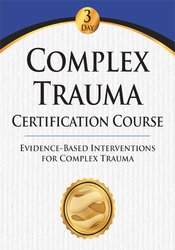

Become a Certified Clinical Trauma Professional Level I (CCTP-Level I) and demonstrate your expertise in treating this population of trauma clients.
While the focus of many trauma trainings is to acquire the basic skills for treating posttraumatic stress, the focus of this intensive Certification Course recording is acquiring skills for effectively treating those challenging clients with complex posttraumatic stress, or C-PTSD.
You will learn evidence-based practices to help heal complex trauma, including difficult symptoms such as intense abreactions/flashbacks; severe “depression-like” shutdown and avoidance; dissociation; relational difficulties and challenges; chronic emotional and somatic dysregulation; chronic pain and psychotic symptoms.
You will leave this recording with a new structure you can apply to the entire treatment course for someone with C-PTSD that pulls from today’s most effective trauma treatment modalities. You will learn how to accelerate treatment with this all-encompassing model, instead of getting stuck trying to use just one trauma treatment modality that may not work for every client.
BECOME CERTIFIED!
Best of all, upon completion of this training, you’ll be eligible for Certification as a Certified Clinical Trauma Professional Level I (CCTP-Level I) through Evergreen Certifications. Certification lets colleagues, employers, and clients know that you’ve invested the extra time and effort necessary to understand the complexities of trauma. Professional standards apply.
For full certification information visit uk.evergreencertifications.com/cctpuk
This online program is worth 18.5 hours CPD.
| File type | File name | Number of pages | |
|---|---|---|---|
| Manual - Complex Trauma Certification Course (39.28 MB) | 179 Pages | Available after Purchase |

J. Eric Gentry, PhD, LMHC, DAAETS, FAAETS, CCTP, is an internationally recognized leader in the study and treatment of traumatic stress and compassion fatigue. His PhD is from Florida State University where he studied with Professor Charles Figley – a pioneer of these two fields. In 1997, he co-developed the Accelerated Recovery Program (ARP) for compassion fatigue – the world’s only evidence-based treatment protocol for compassion fatigue. In 1998, he introduced the Certified Compassion Fatigue Specialist Training and Compassion Fatigue Prevention & Resiliency Training. These two trainings have demonstrated treatment effectiveness for the symptoms of compassion fatigue, and he published these effects in several journals. He has trained over 100,000 health professionals over the past 20 years.
He has written numerous chapters, papers, and peer-reviewed journal articles in the areas of traumatic stress and compassion fatigue. Dr. Gentry is a Master Traumatologist with over 35 years of clinical experience with trauma, Complex PTSD, personality disorders, and dissociation.
He is the president and CEO of The Forward Facing® Institute and owner of Compassion Unlimited – a private psychotherapy, training, and consulting practice – in Phoenix, AZ.
Foundations of Complex Trauma (C-PTSD)
Essentials of C-PTSD
Adaptations to C-PTSD
Overview of Tri-Phasic Model
Assessment & Treatment of C-PTSD
Therapist Preparation
| 5 |
|
| 4 |
|
| 3 |
|
| 2 |
|
| 1 |
|
Satisfaction Guarantee
Your satisfaction is our goal and our guarantee. Concerns should be addressed to info@pesi.co.uk or call 01235847393.
Please wait ...